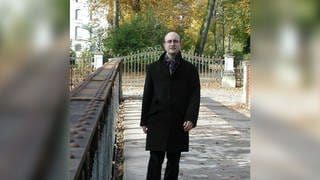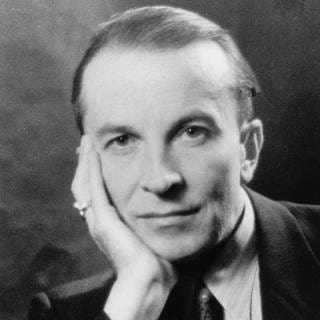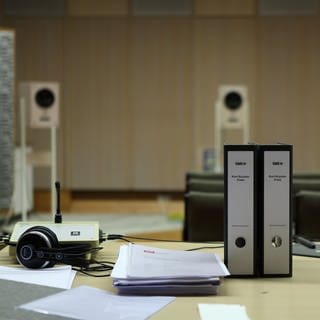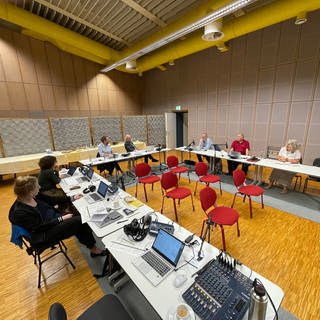The world existed before humanity and will continue to exist after it. Humans have only given it the opportunity to collect some information about itself.
About 1.6 million years ago, the Neanderthals began to spread from Africa towards Europe and Asia. There, they lived from 230,000 to 30,000 BC. Already 90,000 years ago, they encountered Homo sapiens; this could have been the reason for their extinction.
The story begins in Paris in 50,050 BC. A group of Neanderthals chat in a café with a group of Homo sapiens. They drink coffee and talk about this and that. Suddenly, the waiter reveals himself to be an Australopithecus, not yet extinct, and kamikaze-like, blows himself up. The enormous explosion opens the gates to an imaginary landscape of atoms and elementary particles. The clock is reset to 14 billion years ago, to the time of the Big Bang.
The opera is structured according to the division of time into geological ages and periods. As an object- and sound-generated play, the sound dramaturgy is based on the combination and interaction of fragments of this fictitious Paris in the year 50,050 B.C. A saxophone that "doesn't fit into this story at all, but sounds really cool" (as can be heard) illustrates the development of the universe through the parallel sound dramaturgy.
Geologica aims to ironically prompt us to reflect on the fact that humanity is just a brief interlude in the evolution of the universe. As stated in the quote by Italo Calvino, humans have only a small chance of gaining knowledge about themselves. Our limited existence should make us ponder the meaning of our actions, doings, and omissions, about love, struggle, belief in God, reading, throwing coins into wells, traveling, and so on.
In the dramaturgy of sound, the idea of humanity is hardly discernible, almost completely absent; the Australopithecus is truly the only one present throughout the entire 14 billion years. He is cause and effect, the basis of everything that happens in space and time; he observes and comments, effortlessly crossing the threshold between scientific events and biblical legends. Whenever he appears, something significant happens, either destruction or reconstruction; in other words, he serves the same function as the monolith in 2001: A Space Odyssey.
Geologica. All the truth about the origin of the universe
An Acoustic Folly
Approx. 49 min.
Speakers: Stefano Giannotti, Mariola Krajczewska
Saxophone: Fabrizio Desideri
Guitar: Fabio De Ranieri
Text, Direction, and Composition: Stefano Giannotti
Realization: Stefano Giannotti
Production: Author's production 2007
Premiere Broadcast: DLR Kultur on August 3, 2007
Jury statement and competition 2007
"In his 'acoustic farce' Geologica, Stefano Giannotti reconstructs 14 billion years of Earth and human history in fast-forward as a science-fiction comic. From the Big Bang to the Fall of Man, from meteor showers to the birth of Christ, he sends sound postcards from Paris to Seville, effortlessly hopping between science and biblical legend. With imagination and inventiveness, Giannotti combines sound bites with musical sequences and pseudo-orbital sounds into artful miniatures: an ironic puzzle game with acoustic symbols."
The public award ceremony of the Karl Sczuka Prize 2007 took place as part of the Donaueschinger Musiktage. The laudation for Stefano Giannotti was given by media critic Frank Kaspar.
About the author
Stefano Giannotti, born in 1963 in the Tuscan city of Lucca, learned to play the guitar at an early age, studied composition under Pietro Rigacci, and at the age of twenty became a member of the chamber music ensemble "Trio Chitarristico Lucchese" in his hometown, with which he toured Europe extensively from 1983 to 1990. Since 1989, he has been represented as a composer at several international music festivals.
The New York audio artist Alvin Curran, under whom he assisted on projects such as "Crystal Psalms" and "Tufo Muto," influenced his development in radio art. Since 1989, he has been creating sound compositions and radio plays, which were awarded the international radio art prize Macrophon'91 by Polish Radio in 1991 and the Prix Ars Acustica International by WDR in 1994/95, and have been broadcast internationally. In 1997, he began collaborating with Italian choreographer Roberto Castello, for whom he composed the piece "64 variazioni sul tempo" (64 variations on time), which became the nucleus of the radio project "Il tempo cambia" (Time changes), awarded the Karl Sczuka Prize in 2002.
Giannotti lives as a freelance composer, radio play maker, musician, and performance artist in Gattaiola near Lucca. He was a guest of the DAAD artist program in Berlin from 1998 to 1999. In 2000, he lived at Schloss Wiepersdorf with an artist scholarship. From July 2002 to January 2003, he was a fellow at the Künstlerhaus Worpswede.
Karl Sczuka Prize winner in 2002 with the author's production "Il tempo cambia | Time changes" (1997-2001), consisting of 32 I-Ching miniatures.



